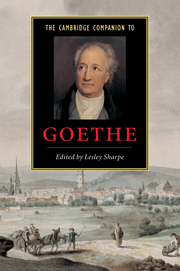Book contents
- Frontmatter
- Introduction
- 1 The world Goethe lived in
- 2 Goethe the writer and literary history
- 3 Goethe the poet
- 4 Goethe the dramatist
- 5 Faust
- 6 Weimar Classicism
- 7 Goethe and the Weimar theatre
- 8 Goethe’s prose fiction
- 9 Autobiographical writings
- 10 In defence of experience
- 11 Goethe and gender
- 12 Goethe and the visual arts
- 13 Goethe and the political world
- 14 Religion and philosophy
- 15 Reception in Germany and abroad
- A guide to further reading
- Index
9 - Autobiographical writings
Published online by Cambridge University Press: 28 May 2006
- Frontmatter
- Introduction
- 1 The world Goethe lived in
- 2 Goethe the writer and literary history
- 3 Goethe the poet
- 4 Goethe the dramatist
- 5 Faust
- 6 Weimar Classicism
- 7 Goethe and the Weimar theatre
- 8 Goethe’s prose fiction
- 9 Autobiographical writings
- 10 In defence of experience
- 11 Goethe and gender
- 12 Goethe and the visual arts
- 13 Goethe and the political world
- 14 Religion and philosophy
- 15 Reception in Germany and abroad
- A guide to further reading
- Index
Summary
When Goethe first drew up a schematic diagram for his planned autobiography in October 1809, he had just completed work on his novel Die Wahlverwandtschaften (Elective Affinities), whose formal elegance contrasts all the more glaringly with the moral and societal crisis depicted therein. In the years since the death of Schiller in 1805, Goethe had witnessed the dissolution of the Holy Roman Empire, the defeat of Prussia, and the reorganization of the political map of Europe by Napoleon. His mother had died in 1808, removing yet another link to his childhood and youth. Under these conditions he undertook the re-examination of his life and career as a writer from the vantage point of a sixty-year-old interested in imbuing individual stages of his life with historical significance.
It is in this context that the title Aus meinem Leben: Dichtung und Wahrheit (From my Life: Poetry and Truth, 1811–33) assumes its meaning: while not neglecting factual information (Wahrheit), Goethe is above all concerned with the refashioning and interpretation of his recollections (Dichtung). In the process, the specific events and individuals depicted in Goethe’s autobiographical writings become paradigmatic not only of important stages in the individual development of the poet, but also of significant moments in the social, cultural, religious and literary life of German-speaking Europe.
- Type
- Chapter
- Information
- The Cambridge Companion to Goethe , pp. 147 - 159Publisher: Cambridge University PressPrint publication year: 2002
- 3
- Cited by

